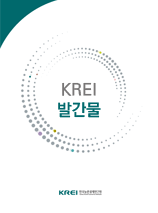요약문
Aim
The aim of this study is to evaluate and monitor local support programs for rural relocation of urban residents, especially their outcome and effectiveness, and to suggest an effective approach to its implementation.
?
Contents
For this, first, the necessity and significance of local support programs for rural relocation of urban residents will be explicated, going over the trend of changes in rural population size. Second, demands of urban residents for rural settlement will be estimated, and also, various efforts of local governments to attract urban residents will be examined. Third, a set of evaluative criteria for the selection of model program areas will be drawn up and, in turn, against these criteria distinctive features of the areas will be examined. Fourth, evaluation and monitoring will be carried out on two levels, namely, a level of planning process and that of implementation process. Finally, upon completing this evaluation and monitoring, an effective model of local support program for rural relocation of urban residents will be suggested, encompassing a full range of important topics, such as the purpose of the program and its target, program duration and scope, principals to be in charge of the program and its implementation, program structure, and monitoring of the program implementation process and evaluation of the program outcome.
?
Findings
Rural population has been declining steadily and therefore, aging rapidly. In turn, this trend has caused rural quality-of-life deteriorating and rural sustainability threatened. However, the current battery of rural policies and programs are targeted to maintain rural population size, which is not enough to either stop or reverse the trend. Rural policies and programs must go beyond explicitly to raise rural population. This policy turn requires local support programs for rural relocation of urban residents to carefully delineate the target group and the roles and responsibilities of the principal bodies to be in charge of the programs.
Upon surveying urban residents, 56.3% of the respondents disclosed their intention to settle in rural areas, and 4.1% among those had a concrete plan to purchase rural housing and land in order to relocate within 10 years. However, current rural policies and programs of child-care support, childbirth encouragement, marriage arrangement for rural bachelors, and so on, do not capture these groups with actual intention to relocate.
After reviewing local conditions, submitted plans and expected output, and interviewing local officials, 10 rural towns and counties are selected.
Monitoring of planning process revealed a number of serious shortcomings. Most of these 10 areas could not relate existing programs and projects to the goal of attracting urban residents to relocate. Especially, unclear program structure and limited time resource spent for plan-making are found to contribute to this problem. However, the emergence of learning process through numerous workshops and exchange of information has been noticed. These findings imply the need for clear delineation of program structure and more aggressive education and public relation programs.
Some suggestions are as follow: first, the goal of this program must be expanded to present urban residents a possibility of new life-style and to attract talented people with entrepreneurship to rural areas; second, localities must be required to spend at least 3 months for plan-making, and program duration must be at least 3 years and should be able to be renewed twice more; third, program content must take a 'positive' approach, with a room for indispensable physical projects and construction; and finally, specific role assignments to central government, local governments, non-governmental organizations and experts must be carefully designed at each stage and contents of the program. In addition, for an on-going monitoring of the program output and effectiveness, a number of indices to be evaluated by sub-components of the program, the program as a whole, and localities are proposed.
Researchers: Song, Mi-Ryung, and Kim, Jeong-Seop
Research period: 2007. 4. - 2008. 2.
E-mail address: mrsong@krei.re.kr
구매안내
KREI의 출판물은 판매 대행사 (정부간행물판매센터)와 아래 서점에서 구입 하실 수 있습니다.
판매대행사
- (주)정부간행물판매센터http://www.gpcbooks.co.kr사이트 바로가기
- 서울특별시 중구태평로 1가 25번지
- TEL 02) 394-0337, 734-6818
- FAX 02) 394-0339
판매서점


